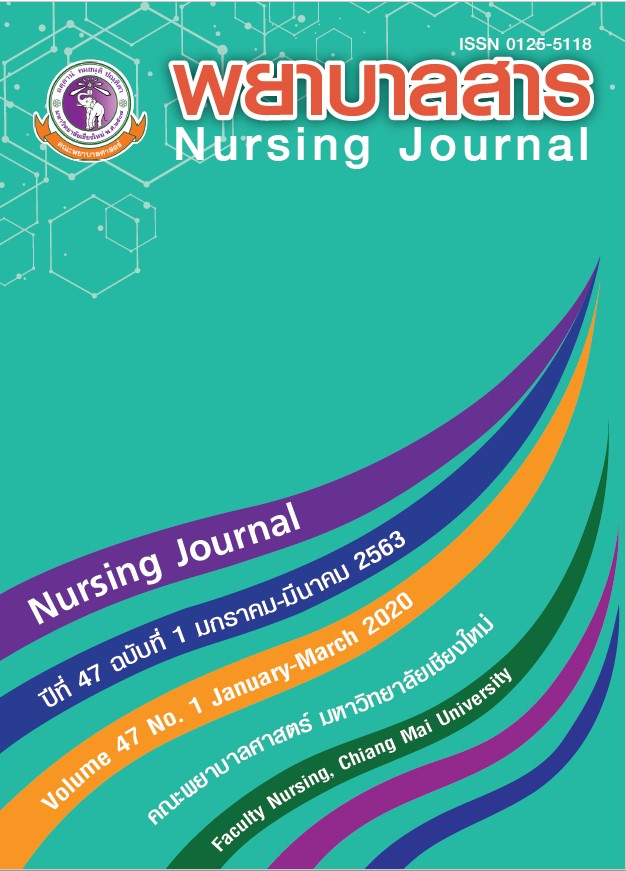Effect of Problem Solving Therapy Program on Depression among Patients with End Stage Renal Disease Receiving Hemodialysis.
Keywords:
Problem Solving Therapy, Depression, Patients with End Stage Renal DiseaseAbstract
Depression is a common mental health problem for patients with end-stage renal disease receiving hemodialysis. The study was a randomized controlled trial experimental research that aimed to investigate the effects of a problem-solving therapy program on depression among patients with end-stage renal disease receiving hemodialysis. Thirty two participants were patients who had been diagnosed with chronic kidney disease receiving hemodialysis and received services from Buddhachinaraj Hospital, Ruamphat Hospital and Inter Vejchakan Hospital from January to June 2017. The instruments consisted of Patient Health Questionnaire (PHQ-9) Thai version and Problem Solving Therapy Program. Data were analyzed by descriptive statistics means, t-test independent and one-way repeated measure analysis of variance.
Result: Participants in the experimental group right after receiving the problem-solving therapy program had a post-test depression score of x̄= 7.00, SD = 2.00. Two weeks later they had a lower depression score of x̄= 5.68, SD = 2.38. Both these scores were statistically significantly (p< .05) lower than their pre-test depression score of x̄= 10.87, SD = 3.59. Participants in the experimental group two weeks after receiving the problem-solving therapy program had a depression score of x̄=5.68, SD=2.38 which is statistically significantly (p< .05) lower than the depression score of the control group which was x̄= 9.25, SD = 3.76.
The results of the study indicated that problem-solving therapy program could be used as an alternative way for hospital personnel to reduce mild and moderate depression among patients with end stage renal disease receiving hemodialysis.
References
Chayakul, C. (2014). Medical Guidelines for Hemodialysis in 2014. Bangkok: Duantula Printing. (In Thai)
Department of Mental Health. (2010). Clinical practice guidelines for social-psychological therapy for disease patients depression for general practitioners in tertiary care facilities [Manual]. Retrieved from http://www.thaidepression.com/www/news54 /CPG-MDD-GP.pdf. (In Thai)
De Souza Tursi, M. F., Von Werne Baes, C., De Barros Camacho, F. R., De Carvalho Tofoli, S. M., &Juruena, M. F. (2013). Effectiveness of psychoeducation for depression: a systematic review.Australian and New Zealand Journal of Psychiatry; 47 (11), 1019-1031.
D’Zurilla, T. J. (1988). Problem-solving therapies. In Dobson, K. S. (Ed.), Handbook of cognition behavioral therapies (pp. 85-135). London: Hutchinson.
D’Zurilla, T. J., Nezu, A. M., & Maydeu-Olivares, A. (2002). Social Problem-Solving Inventory-Revised (SPSI-R) : Technical manual. New York: Multi-Health Systems.
D’ Zurilla, T. J., & Nezu, A. M. (2007). Problem-solving therapy: a positive approach to clinical intervention. New York: Springer.
Erdley, S. D. (2013). Problem-Solving Therapy for Depressed Older Hemodialysis Patients: A pilot Randomized Trial. Retrieved from http://repository.upenn.edu/edissertations_sp2.
Khamphakdi, S. (2012). The prevalence of major depressive disor der in chronic disease patients. Medical Journal of Sisaket Hospital Surin Buri Ram, 27(2), 108-112. (In Thai)
Kongsuk, T. (2007). Depression. Ubon Ratchathani: Siritham Offset. (In Thai)
Lotrakul, M., Sumrithe, S., & Saipanish, R. (2008). Reliabilityand validity of the Thai version of the PHQ-9. BMC Psychiatry, 8, 46-52.
McCool, M., Johnstone, S., Sledge, R., Witten, B., Contillo, M., Aebel-Groesch, K., & Hafner, J.(2011). The promise of symptom-targeted intervention to manage depression in dialysis patients. Retrieved from http://www.nephrologynews.com
Nezu, A. M., & Nezu, C. M. (2008). Problem Solving Therapy for depression. In PST for depression.workshop 2 nd Asian CBT conference- 2008. Bangkok.
Polit, D. F., & Hungler, B. P. (1987). Nursing research: Principles and methods (3 rd ed.). Philadelphia: Lippincott.
Sadock, B. J., Sadock, V. A., & Ruiz, P. (2015). Kaplan and Sandock’s synopsis of psychiatry:behavioral sciences/clinical psychiatry (11 th ed.). New York: Aptara.
Siwiset, S., Hathompanom, W., Yubunpan, S., Bangsaeng, S., & Kotnara, I. (2013). Problems solving therapy group in patients depression and risk of suicide. Journal of Mental Health of Thailand, 21 (2), 98-109. (In Thai)
Tapinta, D. (2015). Depression: Cognitive Behavior Counseling. Nursing Journal, 42 (4), 205-213. (In Thai)
Teles, F., De Azevedo, V. F., Miranda, C. T., Miranda, M. P., Teixeira, M. C., & Elias, R. M. (2014).Depression in hemodialysis patients: the role of dialysis shift. Clinics, 69 (3), 198-202.
Thongyu, R., Kongsuriyawin, W., Phornchaikeu-oyong, A., & Unanapirak, L. (2011). The result of Problem-solving group therapy for depression in the elderly with type 2 diabetes. Journal of the Nursing Council, 26 (3), 78-92. (In Thai)
Thung Khampan, P. (2014). Psychotherapy group for Health Personnel, Concepts and Applications (2nd ed.). Chiang Mai: Klongchung Printing. (In Thai)
Downloads
Published
How to Cite
Issue
Section
License
บทความที่ได้รับการตีพิมพ์เป็นลิขสิทธิ์ของวารสารพยาบาลสาร
ข้อความที่ปรากฏในบทความแต่ละเรื่องในวารสารวิชาการเล่มนี้เป็นความคิดเห็นส่วนตัวของผู้เขียนแต่ละท่านไม่เกี่ยวข้องกับมหาวิทยาลัยเชียงใหม่ และคณาจารย์ท่านอื่นๆในมหาวิทยาลัยฯ แต่อย่างใด ความรับผิดชอบองค์ประกอบทั้งหมดของบทความแต่ละเรื่องเป็นของผู้เขียนแต่ละท่าน หากมีความผิดพลาดใด ๆ ผู้เขียนแต่ละท่านจะรับผิดชอบบทความของตนเองแต่ผู้เดียว






